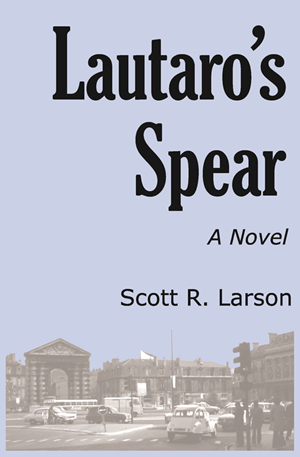“I detest John’s views, but what I detest even more is his effectiveness at espousing them.”When I came across an John B. Anderson’s obituary a couple of weeks ago, it brought a flood of political memories.
—Congressman Robert Bauman, Republican of Maryland, as quoted by The New York Times in February 1980
The Illinois legislator was prominent in U.S. politics during the election year 1980. Strangely, my third novel Lautaro’s Spear, which came out in September, is set in the year 1980 and, though it makes mention of the main political events of the time, it does not mention Congressman Anderson. Nevertheless, he was central to my own political involvement at the time.
It was one of the few times in my life where I actually became enthusiastic about a politician. I had been impressed by Jimmy Carter when he came out of nowhere to become president in 1976. I even saw him up close and in person when I attended a press conference he gave on the campaign trail in Columbus, Ohio. By 1980, however, between a miserable economy and what I saw as a hapless foreign policy—exemplified by an ill-managed attempt at rescuing the Iran hostages—I had become disenchanted. Ronald Reagan and George H.W. Bush were not setting me on fire either, but then I discovered John Anderson.
I felt a natural affinity for him probably because, like my father, he was a Republican Scandinavian-American from the Midwest. With his black-rimmed glasses and shock of white hair, he had the manner of a university professor. Indeed, he spent his post-electoral career teaching constitutional law at a Florida university. Early on, he had been very conservative, a supporter of Barry Goldwater who voted consistently against Lyndon Johnson’s Great Society programs. Over time, though, he evolved. In the wake of attending funerals for civil rights activists, he became more socially liberal and wound up being the deciding committee vote to send the Civil Rights Act of 1968 to the House floor. He reversed his positions on the Equal Rights Amendment, abortion, the Vietnam War and gun control.
Something that did not change, though, was his fiscal conservatism. He understood that social programs were no good if they were not sustainable in the long run and if the economy was shackled by ballooning deficits. That notion seems so quaint these days when Republicans do not care about deficits as long as they get their tax cuts and Democrats do not care about them except when they can criticize Republicans.
He ran for president in 1980 and that—plus the fact that it was hard to find a Democratic caucus in the Seattle suburb where I lived anyway—spurred me to join Republicans by showing up at my first precinct caucus. Previously, I had voted in California, a primary state. I have never felt particular loyalty to any political party, but Washington’s caucus system forced me to pick one—at least for the duration of an election year.
At the caucus I attended in 1980, I was outnumbered by Bush people, whom I found to be bullies. They were determined that all the precinct’s votes would go to their man, and that is what happened. In one heated exchange over internal security, I found myself saying something like, “But I don’t want my country to become like the Soviet Union” to which an irate Bush supporter rejoined with the non-sequitur, “Well, if you think it’s so great over there, why don’t you just go live there?”
Anderson never stood a chance of getting the Republican nomination but, when he decided to bolt the party and run as an independent, I followed him and gave him my vote in the general election. In the end, he got 6.6 percent of the popular vote and zero votes in the Electoral College. For years after, I was berated by friends and acquaintances when they learned how I had voted. One particularly aghast co-worker held me personally responsible for Reagan becoming president. Frankly, since the Gipper carried 44 states and defeated Carter by 489 to 49 in the Electoral College, I never lost any sleep over what part my vote may have played.
By the next presidential election, I would be living in the heart of Seattle in one of the most liberal districts in the whole country and I would be attending Democratic caucuses, largely by default. I was once even a delegate to the county convention. Living abroad now, I no longer attend caucuses. I simply fill out a ballot at home and mail it in.
The passing of John Anderson is a stark reminder of how much things have changed in the past three and a half decades. As hard as it is to believe, both major parties used to have a left wing and a right wing. Political discourse centered on principles and ideas rather than reflexively demonizing one’s opponents. There used to be politicians, even liberal ones, who saw the importance of fiscal responsibility. At the end of Jimmy Carter’s presidency, the federal-debt-to-GDP ratio was 32.5 percent. At the end of Barack Obama’s presidency, it was 102.7 percent.
In a strange way, Donald Trump accomplished what John Anderson failed to. Trump won the presidency despite the opposition of both major political parties. He did not do it, however, by running as an independent but rather by leading a successful mutiny within one of the established parties—Anderson’s old party, as it happened.
That, however, is where the similarity ends. John Anderson was a civil, thoughtful, principled debater in the public arena. His time now seems very long ago.
